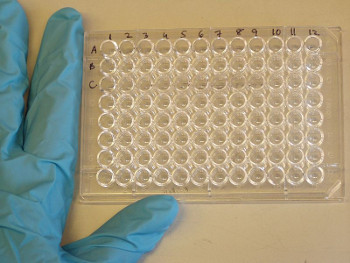The enzyme-linked immunosorbent assay is one of the most sensitive biochemical or immunological tests. It is used a lot in medicine to detect presence or absence of antibodies raised to fight antigens or the specific antigen. The sensitivity of the test results from reliance on enzymes. As you are well aware, enzymes are highly specific.
In the ELISA tests, the enzyme marker is attached to a specific antibody. The antibody then detects the presence or absence of the antigen/ pathogen. The plate is washed after this attachment, leaving behind the antibody-enzyme product if the antigen is present.
What is an ELISA kit?
To test the antigens and antibodies effectively, a specific test kit is required. The ELISA kits contain pre-coated antibody plates, diluents, detection antibodies, buffers, substrates and standards. To detect different antigens and/or antibodies in humans and animals, the following ELISA kits have been devised:

Image credit: Jeffrey M. Vinocur (Source: Wikipedia)
Neurobiology ELISA kits
These ELISA kits have been designed to accurately detect and deliver accurate results. They detect the presence or absence of amyloid beta, tau or alpha-synuclein proteins from cell culture supernatants, cerebrospinal fluid, brain tissue samples or primary neurons. As a result, some of the neurobiology ELISA kits available includes amyloid beta 40/42 and alpha-synuclein ELISA kits. These kits have been used to study neurodegenerative disorders.
Phospho-specific ELISA kits
These are ELISA kits used by scientists and researchers of intracellular proteins involved in cellular signaling pathways. They are also called phosphorylation ELISA kits and they give very accurate and fast results. The results obtained detail the phosphorylated cleavage site-specific proteins and modified proteins.
The kits are very specific and sensitive, and they generate quantitative data. Some of the available kits include human Tau, Human CREB and Multispecies STAT3 phospho-ELISA kits.
Cytokine ELISA Kits
Cytokines are important cell-signaling chemicals. They are very effective and are released in response to inflammations, infections, reproduction, cancer and trauma. Some of the main cytokines produced by the immune system include interferons, chemokines, interleukins, tumor necrosis factor and chemokines. There are many ELISA kits targeting these cells and biomolecules and they are effective in the diagnosis of diseases and allergies. These ELISA kits are specific to diseases and are therefore classified depending on their target.
The extracellular kits are ready to use and they will be packaged with pre-coated 96-well plates, standards, buffers, antibodies and accessory reagents.
In-Cell ELISA kits
These kits provide an accurate and sensitive method of measuring the degree of post-translational modifications and relative levels of proteins in different cell types. 384- or 96-well microplates are used to perform the tests. Infrared imaging system or the standard ELISA plate reader is used for analysis. It is also used for siRNA studies and generally preferred to the Western blot.
In conclusion, the best ELISA kits target specific pathways and thus help in the study of any diseases or abnormalities in the pathways. The kits can also detect different antigens, peptides and proteins. The kits are the best research tools, giving detailed information on diseases and pathways.
